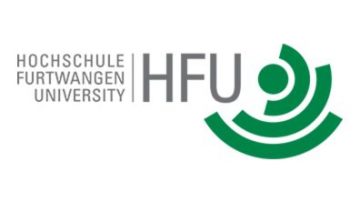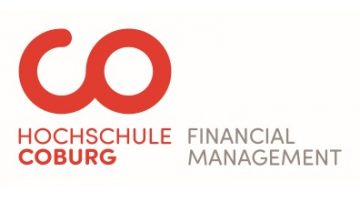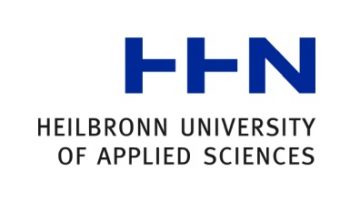Public lecture: A Journey within the Realms of Science Journalism
“A Journey within the Realms of Science Journalism” was the title of the public lecture which gave an example of science communication, respectively science journalism as an important and integral part in research and science. The public lecture hosted two German science journalists Ms. Kerstin Hoppenhaus with her presentation called “Closing the Cycle: Taking Care of Phosphorus” and Mr. Kai Kupferschmidt talking about “Blue: In Search of Nature’s Rarest Color”. For the first time since the outbreak of COVID-19, the DAAD Regional Office Cairo held its first hybrid event conforming to precautions and safety measurements at the Conrad Hotel, welcoming 21 participants online and in the hotel.
Closing the Cycle: Taking Care of Phosphorus
Kerstin Hoppenhaus, freelance science journalist from Berlin, gave a presentation called “Closing the Cycle: Taking Care of Phosphorus”. As “a wake-up call” described Hoppenhaus the new phenomenon of a global phosphor shortage in 2008, leading her to a closer examination of this topic throughout the next years.
Phosphor is an essential yet irreplaceable mineral resource, as it is the foundation for agriculture, the human body and life. Phosphor is sourced through mining and commonly used as fertilizer, Hoppenhaus illustratively explained to the attending guests the phosphor cycle (cf. image below). While distinguishing between natural and industrial phosphor production, she pointed out that due to the tedious development process of phosphor, it is a highly limited resource that takes millions of years to be recreated.
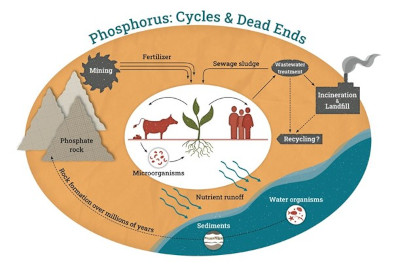
© Hoppenhaus
In 2014 the European Union included phosphor in their list of critical raw materials1, whereas science2 remains undecided if this resource is going to run out by the end of the century or in 300 years, Hoppenhaus accentuated that it is “our responsibility to take care of Phosphor for future decedents”. Despite the complexity of phosphor mining and its emergence, its crucial to actively save and recycle this fundamental mineral for life on earth. Research revealed that approximately 17% of produced food available at the consumer level is wasted3, while private households are throwing away approximately 74 kilograms of food per capita each year ibid. “If we throw away food – we throw away phosphor twice,” remarked Kerstin Hoppenhaus, encouraging the participants online and on site to reflect on their behaviour and contributing to more sustainability by small everyday choices. The presentation was followed by an interactive Q&A session where Hoppenhaus and the attending guests got into a vivid exchange, discussing presented perspectives, insights and solutions.
Blue: In Search of Nature’s Rarest Color
The second presentation of the evening was conducted by Kai Kupferschmidt focusing on the topic “Blue: In Search of Nature’s Rarest Color”. As science journalists strive to educate, raise awareness or transfer knowledge to the public, Kupferschmidt reminisced about the “beauty of following one’s curiosity,” which led him to write an entire book about his favourite colour blue.
According to cultural heritage lore humans always have been fascinated by the colour blue, therefore the public lecture started with an excerpt into ancient Egyptian history, leading the curious guests to “Egyptian Blue” (cf. image below). As Kupferschmidt chose for his talk to focus on the connection between blue and flowers, the guests had the chance to discover insights on the cultural adaption of blue in literature, cinematography or language and its occurrence in nature.
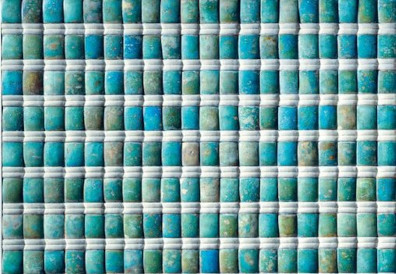
© Kupferschmidt
Scientific approaches on understanding how flowers, in specific cornflowers, become blue go way back to the beginning of the 20th century and the efforts of the German scientist Richard Wilstatter as avant-gardist in this field of research. While he introduced in 1913 the structure of the colourant Cyanidin, suggesting that this molecule causes blue pigmentation of flowers, research theories evolved to be more complex to reveal the phenomenon of blue – nature’s rarest colour. In 2008 Japanese researchers were able to explore through a complex high-tech procedure the actual cause of blue flower pigmentation. As Kupferschmidt’s in-depth research brought him to Kyoto, he revealed to the attentive guests of the public lecture one simple yet fantastic reason to an urging question. “One of the reasons why blue flowers are fairly rare is because it takes them a lot of effort in becoming blue”, comprehending the complex research findings simplified. During the following Q&A session, a further insightful discussion and exchange emerged among the interested audience and Kupferschmidt.
In reflection of COSIMENAs project objectives
While the themed presentations of the public lecture came to an end, the following networking opportunity gave room for further exchange among everyone involved. As DAAD-Alumna Ms. Nehal Elghazawy described “As an academic candidate, attending COSIMENA public lectures has provided me with many interesting networking opportunities that could lead to potential scientific collaborations. The topics covered in those lectures have enriched my personal and professional knowledge regardless of my previous familiarity with those topics”, reflecting on her experience since the launch of COSIMENA in 2017.
The COSIMENA project has vastly evolved ever since in line with DAAD’s motto “Change by Exchange” addressing crucial global topics. As “science journalists and their work are becoming more important day by day” Ms. Isabell Mering, director of the DAAD Regional Office Cairo remarks, reflecting on “the role of science journalists as gatekeepers and facilitators between scientists and the public”. Also, Mr. Felix Halaa, Head of Culture and Education at the German Embassy in Cairo, elaborated on “the relevance of a comprehensive research-based knowledge transition to the public”.
With its public lecture on “A Journey within the Realms of Science Journalism” COSIMENA set once again a stage to foster a vivid scientific exchange, highlighting that the topic of science journalism is certainly relevant for all seven scientific clusters of the project but especially crucial on a greater scale to the society.
Sources:
- https://ec.europa.eu/growth/sectors/raw-materials/specific-interest/critical_en
- https://news.climate.columbia.edu/2013/04/01/phosphorus-essential-to-life-are-we-running-out/
- https://www.unep.org/news-and-stories/press-release/un-17-all-food-available-consumer-levels-wasted
- https://ipch.yale.edu/news-events/ancient-pigment-new-discoveries-egyptian-blue

